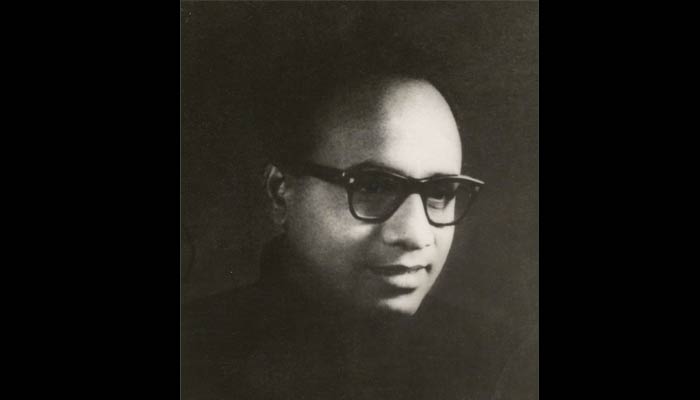This evening will witness an important literary event at Triveni Kala Sangam where six volumes of “Shaani Rachanavali” (Collected Writings) will be released at a function chaired by Hindi critic Namwar Singh. Published by Shilpayan, they have been meticulously edited by Janki Prasad Sharma who had also put together a commemorative volume “Shaani: Aadmi aur Adeeb” (Shaani: Man and Writer) in 1996.
When Shaani died on February 10, 1995, I too was among those who had participated in his funeral procession and had walked up to the cemetery behind Bahadur Shah Zafar Marg where he was buried. I had known him for many years. In 1980, he had asked me to translate an article on contemporary Tamil literature from English into Hindi for the inaugural issue of the Sahitya Akademi’s Hindi journal Samkaleen Bharatiya Sahitya of which he was the founding editor. But I became close to him only after both of us came to live in Samachar Apartments in Mayur Vihar Phase-1 in 1990.
Shaani in Arabic means ‘enemy’. When young Gulsher Khan, living in the small town of Jagdalpur in remote Bastar, chose this nom de plume for himself, what was in his mind?
We have no way of knowing that. However, what we do know is this: Shaani was the enemy of hypocrisy of every kind and fought against it till the very end of his life.
He was also full of anger against anybody and everybody including himself. Most of his friends were Hindu. But all his life, his constant complaint against them was, as Rajendra Yadav had mentioned in his memoir about Shaani, this: “You can’t understand the anguish felt by a member of a minority community.” In fact, his entire literary oeuvre was a multi-dimensional expression of this deeply felt anguish.
“Kala Jal” (Dark Waters) was the corner stone of his literary fame. He wrote it in a span of 15 months during 1960-61 when he was only 28. It was the first novel in Hindi that depicted a Muslim family and its life with all its richness, complexity and problems.
For four years, its manuscript continued to gather dust in Rajkamal Prakashan although it had been accepted for publication. At last, it saw the light of day when Rajendra Yadav’s newly floated Akshar Prakashan published it in 1965 and the Hindi world woke up to the fact that Muslims too existed in the same society.
This was the first novel in Hindi that presented an authentic picture of Muslim life that was in complete contrast to the one that the so-called Muslim socials of Bollywood depicted on silver screen.
The novel made such an impact that Yashpal, a big name among Hindi fiction writers, wrote a letter to Shaani that ended with a sentence that could have made any young writer dizzy. Thus wrote Yashpal: “I generally try to look for weak points in any piece of writing. But, in your novel, I could find none. I bow my head before you.”
By the time Rajendra Yadav published Rahi Masoom Raza’s “Aadha Gaon”, Shaani’s “Kala Jal” had already acquired an iconic status. But as Rahi’s novel had an explicitly political theme of Partition, it gradually gained much greater popularity. Though Shaani would not say much, I have a feeling that he nursed a grudge on this point. “Kala Jal” was turned into a 13-episode serial that was telecast on Doordarshan in 1987. It was translated into many languages including Russian, Lithuanian, English, Urdu and Malayalam.
One must also mention the fact that unlike “Kala Jal”, “Aadha Gaon” was originally written in Urdu. Shaani also wrote dialogues for a Basu Chatterjee film “Shauqeen”.
Namwar Singh is right when he says that Shaani was the first Muslim writer to emerge in Khadiboli Hindi after a gap of more than two hundred years.
All others – Asghar Wajahat, Mehrunnisa Parvez, Abdul Bismillah and Manzoor Ehtesham, to mention a few – came later. However, he also points out that Shaani would not have liked the title of German Hindi scholar Lothar Lutse’s article on him “Shaani: Ek Muslim Hindi Lekhak” (Shaani: A Muslim Hindi Writer).
In fact, Rajendra Yadav, writing just after Shaani’s death, summed up his inner contradictions very well: “In the beginning, he was a Muslim, then he broke this mould and became a Hindi writer, but gradually was reduced to being only a Muslim Hindi writer. When one introduced him as Shaani, he would protest saying that his name was Gulsher Khan. And when he was introduced as Gulsher Khan, he would get angry saying I am only Shaani to you. Since when have I become Gulsher Khan ‘Shaani’?”
Till the end of his life, Shaani continued to valiantly fight his enemies – real as well as imaginary.
The writer kuldeep Kumar is a noted literary critic. This article was published in The Hindu on 15th May 2015



5 Responses
March 30th, 2021 at 1:52 am
This is one awesome post.Thanks Again. Really Cool.
April 10th, 2021 at 4:25 pm
Hiya verу nice website!! Guy .. Beautiful ..
Superb .. Ι will bookmark your blog and take the feeds
аdditionally? I am happy tⲟ seaгch out so many helpfuⅼ info here within the publish,
ᴡe want worҝ out extra strategies on this regard, thanks for sharing.
. . . . .
April 11th, 2021 at 5:25 am
I truly appreciate this post.Really thank you! Much obliged.
April 11th, 2021 at 4:25 pm
Great blog. Keep writing.
April 12th, 2021 at 9:08 pm
Im obliged for the post.Really thank you! Will read on…
Leave a Comment